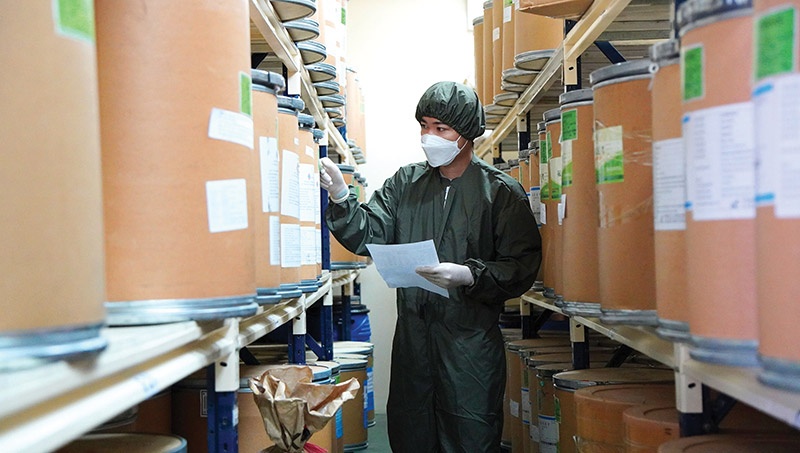FIEs plead for update in drug storage rules
 |
| Drug storage regulations in Vietnam are currently much more favourable for local groups, Le Tien |
More than a month after the recommendation of the American Chamber of Commerce in Vietnam at the Vietnam Business Forum, there is yet to be any revision of Decree No.54/2017/ND-CP guiding the implementation of the Law on Pharmacy.
AmCham made the proposal in hopes of a possible change to Decree 54 towards allowing foreign-invested enterprises (FIEs) to continue participating in warehousing and transportation of pharmaceutical products, providing much-needed assistance in meeting the increasing demand of hospitals and patients.
Decree 54 is said to have made a negative impact on FIEs since it was issued in 2017. Currently, FIEs that have invested significantly in building and operating their warehouses still cannot maximise their capacity and investment, while others are required to invest in such facilities, causing increased operational costs.
Adam Sitkoff, executive director of AmCham in Hanoi told VIR, “Since Decree 54 was issued, AmCham has asked for clarification and revision of the decree to allow FIEs that have already been licensed for drug storage and transportation businesses to continue their services and facilitate the operation of pharmaceutical companies in Vietnam.”
Sitkoff said the chamber acknowledges Vietnam’s reservation of distribution rights for domestic players. “However, Article 91.10.c expands the definition of distribution beyond the World Trade Organization (WTO), the UN Provisional Central Product Classification, and Vietnam’s own law, by including warehousing and transportation services. It is important to recognise that FIEs operating warehouse and transportation services do not affect the distribution by domestic companies,” he added.
In 2016 the Law on Pharmacy was warmly welcomed by the business community, including by FIEs in the pharmaceutical industry, and clearly stipulates the business activities which are allowed. Drug storage services are legitimate businesses of which rights and responsibilities are further stipulated under articles 33 and 45 of the law. The law does not include any provisions which discriminate between foreign and domestic investors.
Decree 54, however, stated that enterprises with import rights but not distribution rights are prohibited from “transportation and storage service of drugs and drug materials”.
Since then, distribution rules in Decree 54 have been an issue of special concern among FIEs. Zuellig Pharma Vietnam (ZPV) is said to be among the affected. ZPV operates the Tan Tao II warehouse and office space in Ho Chi Minh City, a cutting edge facility that utilises sophisticated solar technology and thermal isolation systems to ensure product integrity.
The group had previously been suspected of the disguised distribution of drugs among some FIEs in Vietnam. According to a document earlier released by the Drug Administration of Vietnam under the Ministry of Health (MoH), “Some FIEs investing in storage facilities and drug-preserving services in Vietnam took advantage of the warehousing and logistics systems to distribute pharmaceuticals and benefit from it, and ZPV is a prime example. The firm registered to do business in drug preserving services, but now holds a major market share in the distribution of imported drugs in Vietnam.”
In spite of the concerns, the MoH still keeps them unchanged as it said that they are in line with the country’s WTO commitments.
According to the MoH, Vietnam did not commit to allow FIEs to conduct drug distribution services and in Vietnam’s WTO commitments, distribution services include transportation and storage. Therefore, if Vietnam does not allow FIEs to conduct distribution services, the country cannot allow transportation and storage services under distribution services.
Despite some barriers, Vietnam’s pharmaceutical market continues to be appealing to multinational corporations, with many recently making moves to expand in the country. Currently, about 800 foreign companies are allowed to provide, but not directly distribute, pharmaceuticals in Vietnam.
What the stars mean:
★ Poor ★ ★ Promising ★★★ Good ★★★★ Very good ★★★★★ Exceptional
Themes: Healthcare Platform
- PM outlines new tasks for healthcare sector
- Opella and Long Chau join forces to enhance digestive and bone health
- Hanoi intensifies airport monitoring amid Nipah disease risks
- Cosmetics rules set for overhaul under draft decree
- Policy obstacles being addressed in drug licensing and renewal
Related Contents
Latest News
More News
- PM outlines new tasks for healthcare sector (February 25, 2026 | 16:00)
- Ho Chi Minh City launches plan for innovation and digital transformation (February 25, 2026 | 09:00)
- Vietnam sets ambitious dairy growth targets (February 24, 2026 | 18:00)
- Masan Consumer names new deputy CEO to drive foods and beverages growth (February 23, 2026 | 20:52)
- Myriad risks ahead, but ones Vietnam can confront (February 20, 2026 | 15:02)
- Vietnam making the leap into AI and semiconductors (February 20, 2026 | 09:37)
- Funding must be activated for semiconductor success (February 20, 2026 | 09:20)
- Resilience as new benchmark for smarter infrastructure (February 19, 2026 | 20:35)
- A golden time to shine within ASEAN (February 19, 2026 | 20:22)
- Vietnam’s pivotal year for advancing sustainability (February 19, 2026 | 08:44)

 Tag:
Tag:




















 Mobile Version
Mobile Version